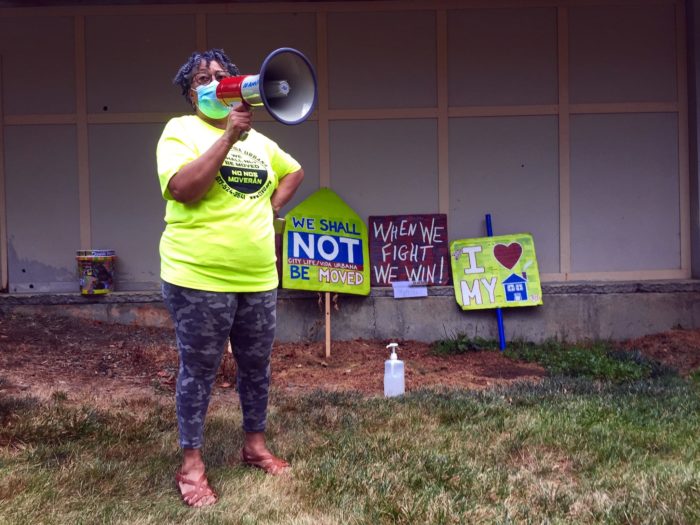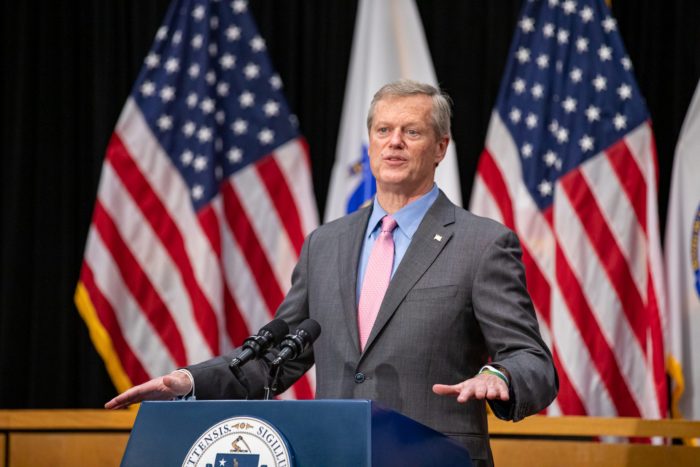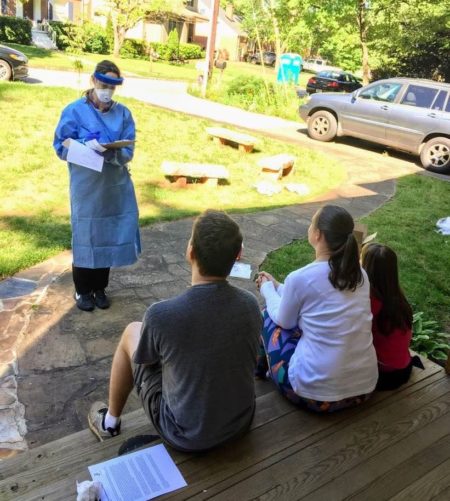
LOCAL
On the eve of the expiration of the state’s eviction moratorium, about 100 activists took to the streets outside of the Boston Housing Court.
The rally, which was organized by City Life/Vida Urbana, was part of a longer campaign to protect housing amid the COVID-19 pandemic.
On the previous Sunday, Oct. 11, City Life took part in a large rally on Boston Common, and on the following Wednesday they rallied at Gov. Charlie Baker’s home in Swampscott. The day after that, the group marched from Boston Housing Court to the State House.
In lieu of any real state action, Boston Mayor Marty Walsh introduced a Housing Stability Pledge. The list already boasts more than two-dozen large property owners who pinky swore to avoid evictions until at least the end of the year.
“The message was really loud and clear,” City Life spokesperson Helen Matthews told the Dig. “We’re on the precipice of a mass eviction crisis. Well over 100,000 households are at risk of eviction.”
City Life/Vida Urbana has been fighting evictions for decades, since its inception in 1973. Despite all that experience in the fight for housing, the battle ahead amid a pandemic-induced crisis is daunting.
“We’ll be doing this for generations,” Matthews said. “This is definitely a fight of a lifetime.”
Although the need for housing activism continues to grow, so too does the energy behind the movement.
“In our growing numbers, we grow our energy,” Matthews said. “We are just preparing to have to do what we don’t want to have to do, which is to respond to evictions with our bodies, blockades, and using all of our legal power.”

STATE
On Saturday, Oct. 18, Gov. Charlie Baker allowed his statewide eviction moratorium to expire, leaving as many as 100,000 Bay State households at risk.
Instead of prolonging the moratorium, Baker announced a proposal to inject $171 million into housing relief. At the same time, the governor announced plans to bring 15 judges out of retirement to fast track the backlog of eviction cases in housing court. As Cambridge and Somerville state Rep. Mike Connolly wrote in a statement to constituents on Sunday:
While many positive steps were taken—from our strongest-in-the-nation eviction and foreclosure moratorium that we passed into law in April (a lot more about that below…), to the federal CARES Act that helped keep the economy going—right now, I can’t help but conclude that things remain very uncertain and deeply concerning.
Because of the unhinged, criminal Occupant of the White House and his enablers in the Republican-led United States Senate, our federal government has too often been aiding and abetting the virus rather than taking the obvious steps to stop the spread and save lives. Meanwhile, Governor Baker has himself too often ignored the warnings of public health experts in his determination to reopen the economy, and he’s consistently brushed aside the voices of marginalized communities and people most impacted by the pandemic along the way.
And because of all this—these past few weeks I’ve once again found myself in a position I had hoped not to revisit: sounding the alarm on an upward trend in COVID-19 cases in our Commonwealth, and fighting for basic protections for our most vulnerable residents. At midnight, our strongest-in-the-nation eviction and foreclosure moratorium law expires. It’s an outcome I’ve been working tirelessly to avoid—however, legislative leaders have so far been unwilling to take final action on the COVID-19 Housing Stability Act, a comprehensive bill that I worked to draft with Sen. Jehlen, Rep. Honan, and the Homes for All coalition, which includes several Black-led and People of Color-led housing justice groups from around the state.
Instead of passing our equity-based proposal to extend protections for vulnerable renters and homeowners and offer relief to all, including small landlords, legislative leaders have effectively ceded our policymaking role to Governor Baker, who convened an invitation-only group behind closed doors to draft something they are calling the “Eviction Diversion Initiative.”
While everyone agrees Baker’s plan includes certain positive steps — ultimately, it seems likely to be yet another example of the sort of inadequate policy that typically results when people most impacted aren’t given a meaningful voice in the process. The Baker Administration says their plan will allocate direct financial support for “up to 18,000 households.” However, a recent analysis by Metropolitan Area Planning Council (MAPC) says an estimated “60,000 renter households fear imminent eviction.” This week the Boston Globe reported the Chief Justice of the Trial Court thinks there could be as many as 200,000 evictions. And last week the Massachusetts Budget and Policy Center cited a National Low Income Housing Coalition estimate that says up to 300,000 households in our state are at risk of eviction.
The state’s Attorney General Maura Healey, who has been cited as a potential gubernatorial candidate in 2022, called on Baker to extend the moratorium days before it expired. At the same time, she stopped short of criticizing Baker’s plan in a press statement.
Even before legal paperwork is filed, there are likely to be hundreds of families that leave their homes because they are not fully aware of how the eviction process works, and what rights they may still have, according to Matthews of City Life.
“Many people just pack up and leave when they get a notice from their landlords,” she said. “Even though they absolutely have the right to fight it in court, many people don’t understand that or feel afraid.”
 NATIONAL
NATIONAL
It appears that tenants in the Bay State may have to rely on the federal government to protect their homes. The Centers for Disease Control announced its own nationwide eviction ban at the beginning of September through the end of the year, out of public health concerns. The Oct. 9 notice reads:
The Order temporarily halts residential evictions of covered persons for nonpayment of rent during September 4, 2020, through December 31, 2020. This means that a landlord, owner of a residential property, or other person with a legal right to pursue an eviction or a possessory action cannot evict for nonpayment of rent any covered person from any residential property in any U.S. state or U.S. territory where the Order applies
“Crowding is only going to ignite the spread of COVID,” Matthews said.
Basically, a spike in evictions will mean that more families will have to leave their current sheltering situation and move in with other households or find additional housing, all of which increases the likelihood of spreading and contracting coronavirus.
The CDC order also halts pending evictions that were started in early September, but in order for tenants to qualify, they have to sign an affidavit attesting that they suffered reduced income due to the pandemic, that they have already attempted to gain federal assistance, and that their eviction would result in homelessness.
The National Apartment Association, which represents more than 85,000 property owners, joined a lawsuit against the CDC in an attempt to get the order banning evictions rescinded.
“This action risks creating a cascade that will further harm the economy, amplify the housing affordability crisis, and destroy the rental housing industry,” NAA President Bob Pinnegar said. “This global housing crisis cannot be blamed on the rental housing industry, nor can the industry bear the brunt of the pandemic alone.”
Zack is a veteran reporter. He writes for DigBoston and VICE, and formerly reported for the Boston Courant and Bulletin Newspapers.

